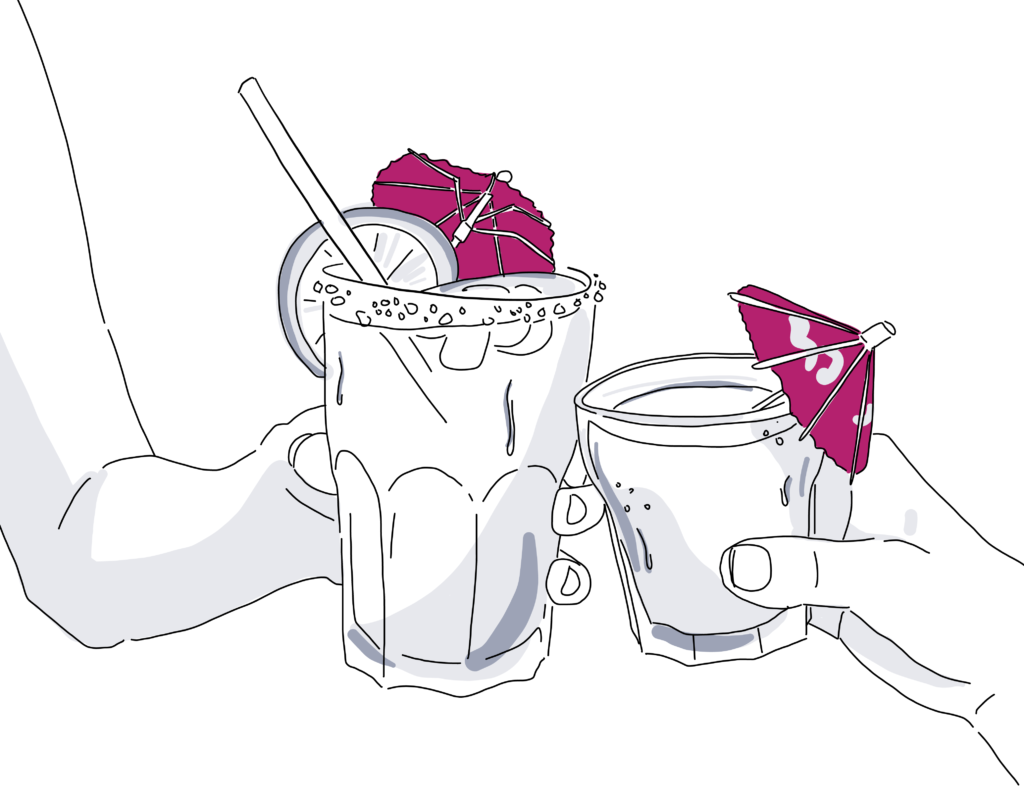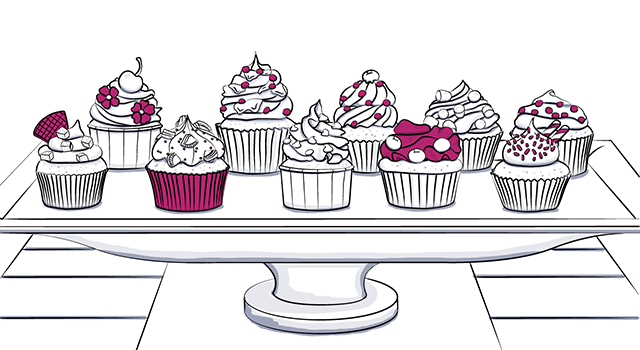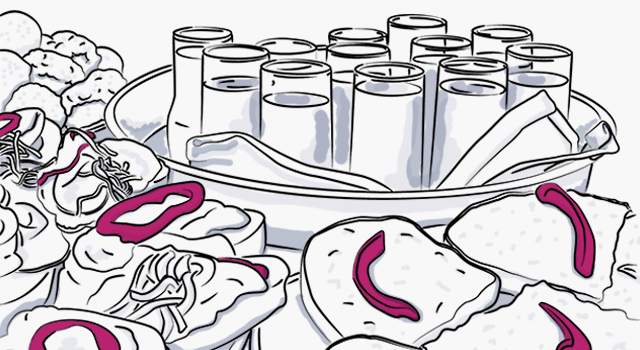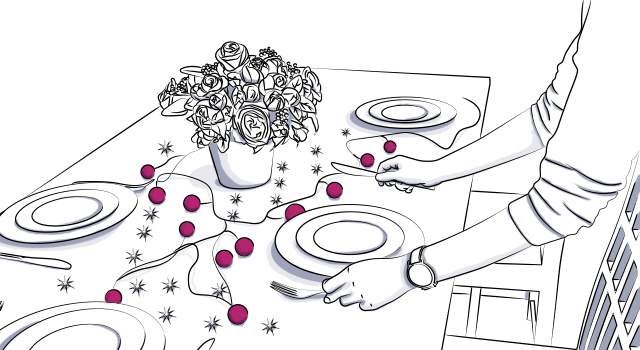
31 Tips to Setting a Buffet Table at an Event
Today, we’re sharing a few tips on setting the perfect buffet table. Whether you’re throwing a Southern summer soiree or an elegant wedding, these ideas will help you manage the food service and the flow of your guest experience:
Tips for Setting a Buffet Table

1. Vary the height
Just as you would vary heights with centerpieces, you should do the same with a buffet. It is more appealing to the eye and will add dimension to your set-up. Make sure to elevate the less messy dishes as you don’t want sauces to spill on your tablecloth.
Some people stack books under the tablecloth to create elevation; however, I prefer to vary the heights on top of the tablecloth using beautiful serving trays or eclectic items. Place taller items in the back (assuming that your table is set up against a wall.)
2. Have a clear beginning
Guests should know where the buffet table starts and ends “ keep all plates on one end of the table. This will prevent a traffic jam. If you have a big group, pull the table away from the wall so that people can go along either side of the table.
3. Identify dishes
This is becoming increasingly important with all the different diet restrictions today. When developing the menu, consider your vegetarian/vegan guests and any possible allergy restrictions. Label all dishes and if necessary, include any important ingredients, such as, contains peanuts.
This is an opportunity to show your creativity! Your labels can be as simple or as colorful as you would like to make them “ dress them up if you are throwing a themed party.
We’re fans of labels hand-written in calligraphy. (Learn how to write in calligraphy!) Make sure font is a large enough size for guests to read, especially if the event is dimly-lit for an evening soiree.
4. Give some support
Place small plates near each dish so that guests have a place to put serving utensils. You may also want to put a small plate under a beverage dispenser if it has the tendency to drip.
[Tweet “Make sure to elevate the less messy dishes as you don’t want sauces to spill on your tablecloth.”]
5. Save utensils for last
You don’t want guests fumbling with their napkins and eating utensils as they are filling their plates. Keep those at the opposite end of the table from the plates.

6. Position strategically
Place items that you have a smaller quantity of at the end of the table near the utensils. Guests tend to fill their plates with the earlier dishes, so with your strategic placement, your food will last longer.
What sweet foods will be on your buffet table this year? Learn about all of the latest event catering trends here.
7. Use strategic layouts
The way you place your tables in the room is really important. In addition to good design, you’ll need to incorporate practical elements that control overcrowding, server access, and ease of use for people with disabilities. You might even want to consider choosing station-style over a buffet serving system.
8. Create an Instagram-worthy table backdrop
Start with your theme and event colors. They’ll help guide the majority of your choices. Decide what vibe you want the background to be. Do you want it to be cute and whimsical? Or glam and upscale? Whatever you choose for your buffet table, make sure you use eye-catching extras like wallpaper, garlands, streamers, or even balloons that coordinate with your serving platters and dishes.
9. Stage serving dishes and bowls before adding food
There’s a lot we can learn from food photography that will help us set up the perfect buffet table. Staging your table is just one of many lessons but it’s a good one to keep in mind. Not only does laying out all your major table components help you decide where everything should go, but it also helps you see if you have too many or too few elements for the space.
10. Direct the flow of traffic
A successful traffic flow is created by using one of three techniques: full circle, lining up, or dual side serving.
- The full circle uses circular tables that guests can orbit around whenever they please. This keeps the space open and airy, which is most ideal for cocktail hours or networking events.
- The traditional line up helps keep things neat and compact in even the tiniest of food serving spaces.
- And finally, the dual side serving station allows larger groups the opportunity to get through buffet lines faster, which is especially important for events where speakers or featured or other activities will be taking place.
11. Coordinate table linens and napkins with your event theme
Even if you’re using paper napkins, there’s no reason why you can’t keep everything looking cohesive. Matching your linens, napkins, and even your tableware can bring the whole look together for a more polished, professional event image.
12. Use serving spoons for display
Curly canape spoons are great for tasting parties, but they’re also very useful for buffets. Whether or not you opt to share these via tray pass in addition to your display, these versatile showboats make great vehicles for more expensive items (like sushi bites and caviar) or messier treats (like puddings and mini ravioli resting in sauce).
13. Serve more cold food than hot
The golden ratio for buffets is roughly 80% cold food and 20% hot. Cold food is easier to refill and control temperature-wise, which makes this approach both more practical and safer from a safe food handling standpoint.
14. Separate drinks from food
Drinks can make table clothes wet which is a bad look when mixed with hot, fresh food. So when setting up a buffet, keep your bar area and nonalcoholic beverages at their own stations so that guests can self serve without dripping into the h’orderves.
15. Regularly clean drink stations
Keep puddles and tablecloth stains at bay by assigning event staff to this specific task. You’ll also need to keep an eye on ice, water, and refills anyways, so make sure clean up is part of your regular buffet beverage maintenance. Depending on what you are using for your table covering, you may want to have a backup in case things get really out of hand.
16. Fill in display gaps with seasonal decor, candles, and flowers
Depending on the time of year, you can use faux foliage, pinecones, flower petals, or even seashells to build out your event theme through your buffet table. If you opt for candles, make sure they are not scented ” otherwise, they might compete with the delicious aroma from the food. And for your flowers, focus on single stems placed in low vases so guests don’t accidentally knock them over.
17. Label all food, snacks, and beverages
Buffet food labels are easy to make. Whether you opt for calligraphy or printed, folded or in stands, they’re an essential addition to your buffet for both practical and aesthetic reasons. If your guests have any allergies or dietary needs, make sure to properly label dishes that comply. And, if you have space, name each dish and include their key ingredients so guests know what they’re in for before taking a bite.
18. Experiment with pipettes
Pipettes are one food and beverage trend your guests will definitely be excited to try. They’re unique and make for more interesting food displays. Fill them with sauces, dressings, or even dessert toppings. Whatever you choose to do with them, the dramatic effect of a mini pipette will certainly be a conversation starter.
19. Provide trash cans
It may seem obvious, but you’d be surprised how many events forgo using trash cans near their buffet tables ” if at all! Discreetly hide some stylish bins near the end of the table, far away enough from the food to keep things appetizing but close enough that people actually use them.
20. Choose color palettes that pop
The perfect color palette for any event, venue, or buffet table depends on your theme. But if you want your gorgeous buffet table to take its rightful place as the center of attention, you’ll need to save your most impressive colors for the display. Think about what feeling you’d like your guests to experience at the buffet table then choose colors and a color theme style that reflects that.
21. Stagger access points
Convenience is everything when you’re serving food buffet style. Have more than one serving utensil available for big bowls and trays. Have multiple rows of cups available so guests can grab more than one at a time if needed. Place napkins at the beginning of the table and at the end of the table in case someone forgets to grab one earlier. Details like these make the overall experience far more organized and pleasant for everyone.
22. Offer both store-bought and homemade items
This tip is mostly for your own sanity, since feeding a whole crowd of people an entirely home-cooked meal isn’t exactly doable for most event budgets or teams. To make everything look nice together, place all your food in cohesive displays and make sure to garnish store-bought options that same way you would for their homemade versions. And be sure to take some inspo from these genius hacks that make your store-bought food look homemade.
23. Properly fold napkins
Napkins should be easy to grab as you’re walking by. The way you fold your napkins will determine whether or not it is. Cocktail-sized paper napkins are traditionally displayed in a spiral stack so guests can pinch one or two off the top without having to touch the rest of them. And, if you’re offering linens ones at dinner, consider rolling them with silverware and displaying them in a basket so guests can grab and go.
24. Provide utensils directly in food displays
Miniature soups, salad bites, and skewers make transporting finger foods from display to mouth so much easier. Plus you can get creative for how food is paired or arranged. And you’ll benefit from having fewer dishes to clean by the end of the night.
25. Display layered dips and desserts in mason jars
The mason jar craze will live forever thanks to adorable food displays at events. Show off all your delicious ingredients in these glass receptacles. Decorate the jars to match your event theme and colors with strings, bows, or even mini handkerchiefs. The ability to portion out food this way will also keep guests from overindulging.

26. Arrange food from least to most expensive
Hungry people tend to pile on foods like salads, bread, and appetizers when they first get in line at a buffet. As they move down the line, their plates fill up, leaving less room for the steaks and salmon dishes at the end. Another great psychological tactic for event portion control, this tip will save you from having to stock up on your pricier dishes.
27. Use stamps to dress up wooden cutlery or serving utensils
Flat, light-colored wooden utensils are easy to personalize. Use stamps with your company logo, slogan, or event name in colors that match your theme. You can even go a step further and use food-grade ink to stamp the same design on cake fondant or even sandwich bread. This is a great tip for corporate events that plan to use their buffet as part of a brand-building effort or weddings that want a more affordable way to achieve a polished, cohesive look.
28. Group similar foods and flavors together
Ever heard of the flavor matrix? It’s a really useful chart that professional chefs look to when creating new flavor combos and pairings. If you really want to get creative, use it to strategically group and display your food at the buffet. But if you’re not interested in getting that detailed, just keep obvious pairings like soups and salads or dips and chips a logical distance from one another.
29. Decide on minimalism versus maximalism
Maybe you prefer a contemporary, streamlined look for your event. If that’s the case, a table with uniform bowls and platters, equally spaced with plenty of room to breath is your best bet. But if you’d like to go all out and exude a sense of extravagance, an overflowing display of foods, garlands, candles, stringed beads, and even feather boas might be more your style. Whichever you choose, a bold design in either direction will really impress your guests.
30. Only use high quality and stylish disposables
There’s a difference between squeaky white styrofoam and sleek, well-designed black plastic plates. Treat your guests to the best possible version of your throwaway dishware and cutlery. Also be sure to pick ones that match your event theme and colors.
31. Use a chalkboard table runner or kraft paper to label food
If food display signs aren’t your thing, use your tablecloth instead! Black paper and chalk instantly become a fun and informative display while kraft paper and a marker add rustic whimsy to any occasion.
Have more questions about setting buffet tables?
Set up a buffet table to match the flow of guests. This means placing cutlery at the dining tables so there is a smaller chance of a fork being dropped, and having dining plates at the beginning of the buffet table so guests don’t need to carry them as they walk to the buffet. To save on budget place more expensive food items toward the end of the buffet table, because guests are more likely to take larger portions of earlier food items.
The placemat goes first, followed by the charger. Plates will be placed upon the charger as they are served. The napkin is placed next, typically on top of the charger or an empty plate at the start of the meal, although it can also be placed under the cutlery. Cutlery is placed such that the fork is on the left and the spoon and knife are on the right. The drinking glass is placed to the right of a setting.
There are a few guidelines that you can rely on no matter how food is being served. For a cocktail party with hors d’oeuvres, count on one 7″ plate per person per hour. For a buffet, two to three dinner plates per person, plus one dessert place per person is a safe bet. For a full service meal, use one 10 1/4″ plate for the main course, a 9″ plate for salads or appetizers, and one 6-7″ plate each for bread and dessert.
For more on F&B at events, check out these other great resources:

